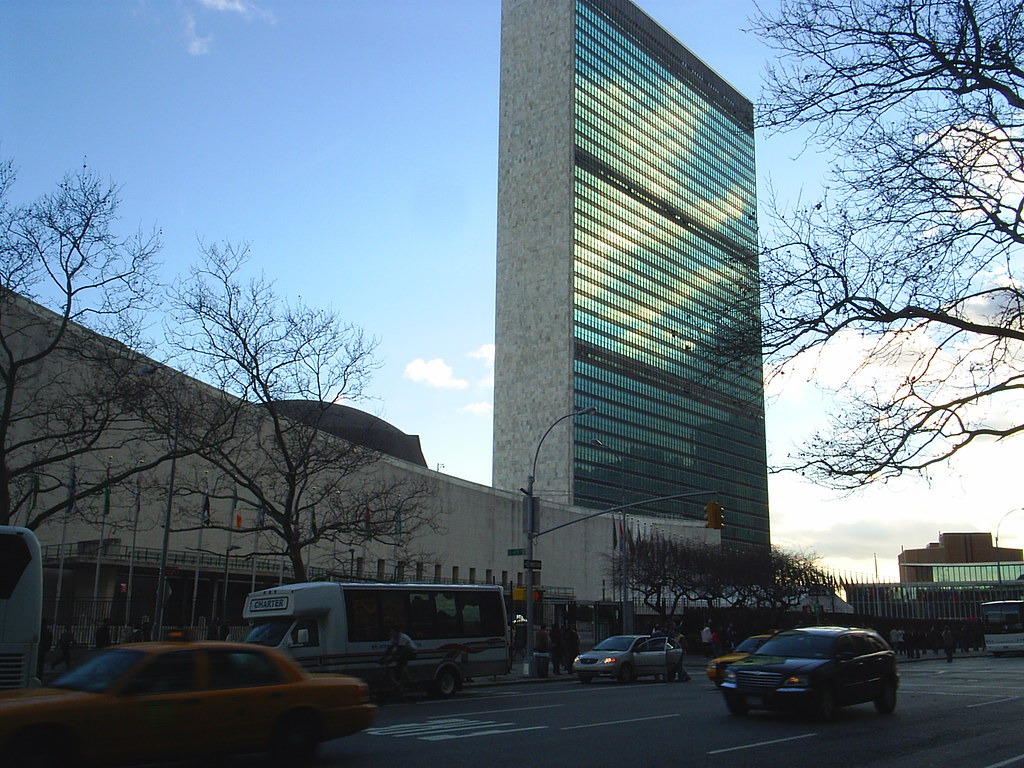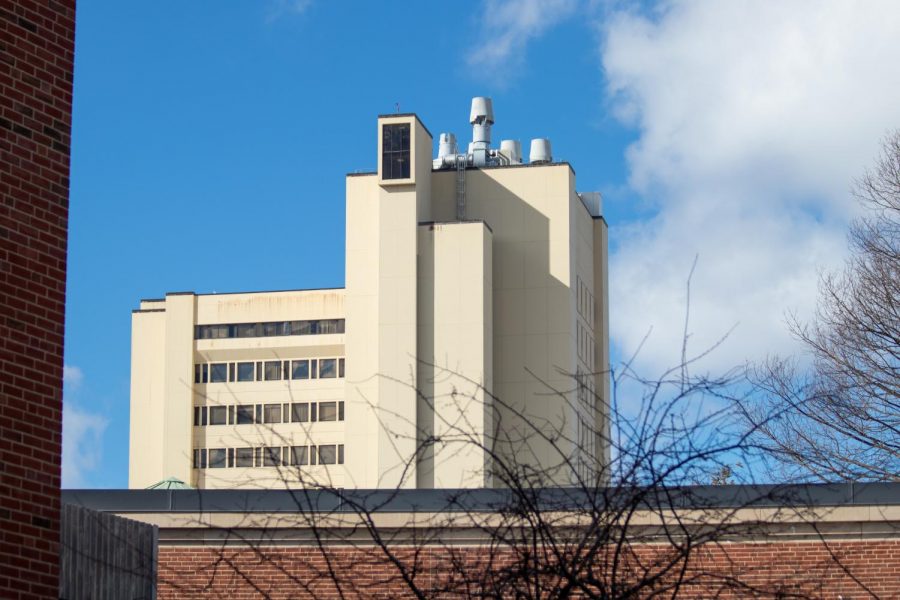
The Fine Arts Center is ugly, especially when it rains, and its layout is bizarre to say the least. Herter Hall is equally as ugly, and a creepy tunnel connects it to the unattractive Bartlett Hall. In fact, most of the buildings on campus – the Campus Center, Worcester and Franklin dining commons and the concrete jungle, Southwest – aren’t very pretty.
It’s nothing personal, and certainly not unique to UMass. All over the world, ugly buildings stand as monuments to our recent architectural past. Many of them were designed in the Brutalist style, an offshoot of Modernism that became the dominant style after World War II, when devastated European nations were looking for cheap ways to rebuild. Brutalism, so named by Swiss architect Le Corbusier for the use of a type of raw concrete called “Béton brut,” fit the bill.
Its structural integrity, bare-bones simplicity, and lack of bourgeois frills caused Brutalism to take hold in Communist countries as well. While Communism failed in Eastern Europe, relics of that history still loom. Even in countries not looking to rebuild or reboot, Brutalism caught on as a futuristic aesthetic and helps explain why so many ugly buildings dot our campus.
Now that it is the “future,” however, they feel dated and even alien, reminders of a time after one war and full of fear of another.
“Form follows function,” a phrase coined by American architect Louis Sullivan, was a Modernist idea that came to take on a near moral significance that still has resonance today. Case in point: ugliness is so familiar to those born and raised in modern America that many view it as nearly comforting. The sight I look forward to most when returning home is getting off the highway and driving down the familiar stretch of road containing, amongst other things, gas stations, fast-food joints and a 7-Eleven just before the turn onto my street. And in a strange way, these ugly things feel like home.
However, sometimes I wonder if the love of the ugly reflects in me is only an adaptation to what British philosopher Roger Scruton calls the “cult of ugliness.” Its advocates believe that the modern world is so random and meaningless that it is irredeemable by art, and so in the past century or so, art has increasingly sought to shock or disgust audiences in an attempt to make statements or break certain taboos. Scruton wonders if the world will be made even more meaningless if we lose truly beautiful art as an escape from our often difficult lives.
Scruton notes that in our modern utility-based society, “something has a value if it has a use,” and sarcastically asks, “What’s the use of beauty?” Beauty does indeed have a vital use, but it’s not one that is immediately obvious.
Beauty feeds people in important personal and spiritual ways often glossed over in modern culture. As someone who is interested more in “humanities” topics than “useful” topics, I’m often met with questions such as, “What’re you going to do with that?” or, worse, “Why not study something useful, like science or math?”
There is no denying the usefulness of science and math, but we must keep in mind that usefulness is not a zero-sum game. Without “useless” artists and thinkers evaluating and questioning the onward march of progress, creativity and beauty run the risk of being stamped out, labeled as excessive and not deserving of time and attention.
Of course, it’s not all doom and gloom. There are beautiful things, natural and manmade, all around.
On the UMass campus, the Old Chapel and buildings such as Stockbridge hall or the dorms of upper Central pay homage to a prettier past. Without some knowledge of why we’re losing our grasp on the truer beauty of earlier times, however, as those buildings deteriorate, so will our memories of a time before concrete slabs and geometric walls. Connoting beauty through utility, as proponents of Brutalism have, leads one to believe that things that are actually beautiful like novels or poems or works of art or marvels of nature aren’t worth anything because they don’t have a practical use.
Scruton’s other modern cult, the cult of utility, dominates our modern landscape and devalues those seemingly useless things that are extremely important to our spiritual and aesthetic lives, lives many people forget we actually live. We live them quietly, so quietly in fact that the loudness of modern life can drown them out. Don’t let this happen.
Hannah Sparks is a Collegian columnist. She can be reached at [email protected].












![By freestocks.org [Creative Commons Zero], via Wikimedia Commons](https://dailycollegian.com/wp-content/uploads/2024/04/Picture1-1.png)






Dixie Hart • Apr 3, 2013 at 6:16 am
I just took my daughter on a tour of UMass Amherst. She is considering entering UMass her freshman year. What an UGLY campus. There is absolutely nothing charming or compelling about this campus, or those monster high rise dorms. Their real mission was to put as many kids as they could into a building, which is pretty sad. I expected more from a leading MA university. I was shocked by the lack of landscaping and lack of pedestrian walkways. Architectural planning appears disconnected and disjointed. UMass buildings dwarf students, and radiate a cold, impersonal milieu. Even I could have designed better. And lets talk about the DuBois library and all those floors – crazy. How about a student union that invites students to stay, a few quiet corners, rather than that grey, dark, military structure. How about weavings or art on the walls? Even the new buildings are boring and rectangular. Yes, lots of glass, but void of creative warmth. The carpeting at Franklin Dining was dirty and worn, and tables and chairs scratched and outdated. We did not linger. There is certainly intelligence at UMass, why can’t they get it right?
Eli Gottlieb • Feb 8, 2012 at 10:42 pm
But the awful architecture is what gives UMass its charm!
Well, ok, go ahead and make the place nice now that I’m not there to enjoy it.
Alexander Clement • Feb 4, 2012 at 12:54 pm
I find it fascinating that Brutalism in architecture still elicits debate, even though the style is more than 40 years old. Perhaps it is because it is experiencing something of a renaissance (in Europe at least) and architecture is once again emerging from the anodine morass of post-modernism and neo-vernacular. I studied Art and Design History at college and learnt to find beauty in unlikely places, not just in the obvious ones. There is, undoubtedly, a need for beauty and frivolity although it is important not make the mistake that something apparently ugly has no beauty in it. There is extraordinary beauty in Modernist architecture and, believe it or not, in Brutalism. I studied the style extensively for a book on the subject and discovered an extraordinary degree of care and attention on the part of the architects in the design process of many buildings now considered notorious in Britain. True, we should not become inured to the march of market forces in the marginalisation of art by those who find it useless. We should fight for aesthetics and art for art’s sake. It is to all of us, even if some aren’t aware of it, nourishment for the soul.
Mike L • Feb 2, 2012 at 8:21 am
I agree! How Umass looks greatly affects how desirable the campus is and who applies for admission. If we were to make the university look like Amherst College with domed buildings that have pillared entrances maybe then we could attract money like Amherst College! That way the chancellor could get a fatter salary and we wouldn’t need to pay financial aid. Get paid by students instead of pay for students.
No, invest money in the stuff that matters. Developing academic programs to make Umass grads more competitive with the other universities in New England. Maybe you should have chosen a different university to study humanities.